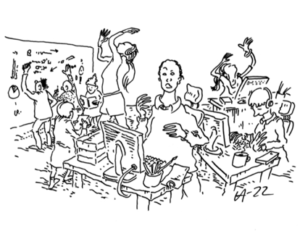A guest Blog from Angela Loynd
I’ve never been particularly good at writing. It’s not that I don’t have a wild imagination, far from it. Without the stress and anxiety (and dare I say ‘trauma’) that emerges from my youth in both the primary and secondary education setting, my brain can do amazing things. But writing them down on paper (or on my laptop) has always been difficult for me (you’ll see this in my LinkedIn posts which are always inevitably ‘edited’). Thank goodness for the modern technical tools that help us to succeed!
I was recently asked by a wonderful LinkedIn connection and fellow neurodiversity advocate (Joyce CoomberSewell) to write as a guest blogger on this site, a seemingly simple task for some, but whilst I was incredibly honoured, it filled me with fear, anxiety, and dread. Imposter syndrome had kicked in. What is that, I hear you ask? Impostor syndrome (IS) refers to ‘an internal experience of believing that you are not as competent as others perceive you to be… it has links to perfectionism and the social context’ (Cuncic, 2021).
Who would want to hear my story?
Why would they want to know? Why would they care? Why would it matter? All these questions suddenly swirled around, penetrating and invading the magical and creative space in my head. Then it hit me. All the work I’ve done over the past few years came into effect, the positive self-talk, the mission to help others like me, and the adolescents and young adults who are still finding or yet to find their own voice. If it only reaches one of you, this one is for you.
I write ‘micro-blogs’ I like to call them and share others’ wisdom almost daily on social media. I’m no expert, only in my own life. But I do believe in sharing what has worked for me, and I’m constantly learning every day from others, including my own Neurodivergent Adolescent and Young Adults (NDAYAs). I write about positive ND affirming topics, support strategies, #ndhumour, but I also share my stories of trauma, feelings of being lost, the constant searching through what I can only describe as ‘The Matrix’ we live in for answers to ‘Who am I’?
 We neurodivergent (ND) folx do this often, with a bag of tricks which generally includes our multitude of masks, strategies, and scaffolding techniques. However, statistics will show you that we have high rates of mental health comorbidity, social and financial inequity, experience workplace bullying and harassment, and relationship distress. I for one know full well the serious ramifications of workplace bullying, the breakdown in mental health, the tears, the pressure on my family, the struggle so real that I almost ended my life.
We neurodivergent (ND) folx do this often, with a bag of tricks which generally includes our multitude of masks, strategies, and scaffolding techniques. However, statistics will show you that we have high rates of mental health comorbidity, social and financial inequity, experience workplace bullying and harassment, and relationship distress. I for one know full well the serious ramifications of workplace bullying, the breakdown in mental health, the tears, the pressure on my family, the struggle so real that I almost ended my life.
Diagnosis
I was going through my diagnosis at the time, clearly struggling and in need of support from my peers and management, as well as simple adjustments in the workplace. I was confused, lost, distressed, and traumatized – I didn’t know any better. But in the workplace, especially a large organisation embedded in healthcare, you have no excuse. You have a duty of care. You have a moral and professional obligation. The ableist, toxic behaviour you exhibited was life-threatening… Shame on you.
Joyce, thank you for inspiring and believing in me, when I didn’t believe in myself! My husband always does and said I should have done this, so he’s claiming responsibility for instigating the newsletter! (Henrik, you are my rock, I love you so much.)
References:
Cuncic, A. (2021). What is Imposter Syndrome? Verywell Mind. https://www.verywellmind.com/imposter-syndrome-and-social-anxiety-disorder
This is an excerpt to a fictional piece which may provide some insight.
(All identity descriptions are written as ‘they’, ‘them’, ‘their’)
Mofaux in ‘Wonderland’ – A story of turning the tides.
“I’m finally starting my new job at Wonderland. The dream job, I’ve worked hard, interviewed hard, I’ve won big, finally!” After the normal ‘new job’ nerves settle, Mofaux is excited to be part of the team. Thinking silently, ‘nothing I can’t handle”. With significant work experience up each sleeve, Mofaux is a top performing graduate from a high-ranking university, confident, well resourced, popular, charming, and moderately socially and economically carefree.

Mofaux walks in for the first day in the office. The workplace appears like most shared office spaces, but something is different, odd, unnerving. Mofaux can’t put a finger on it but feels anxious immediately. It’s 9am and some of the desks are empty, the phones are silent, the lights are dimmed, and nobody is talking. It’s a surreal experience and it knocks Mofaux off-balance, anxiety rising in their throat. There’s a young person in the corner office flapping hands wildly, but nobody seems to care or notice. Another room to the side seems to be soundproofed and there’s a team of people inside, conversing madly, scribbling ideas wildly on paper and whiteboards spread throughout the room, some dancing and listening to headphones, to what Mofaux can only imagine is music.
Wondering if they’ve just abseiled down the rabbit hole, there’s not a soul in the office who is taking the slightest bit of notice to this bizarre and unusual performance. Mofaux finally sits at their allocated desk, others directly nearby are introduced briefly, and then they return to their work, placing headphones back on in the process. The manager appears, explaining the day, which is to be spent adjusting to the workplace, working through the self-paced ‘Wonderland’ induction package, before being asked if there is anything they need to make their day and time here more comfortable?
“What the hell is going on?” Mofaux can’t take it anymore – anxiety, frustration, and fear exploding from within. Panic sets in, but the mask has finally fallen. The manager meets Mofaux’s confused gaze and sits down quietly for a few minutes on the seat nearby, only asking how they can support Mofaux at this moment. Mofaux shakes their head confused, bewildered, but calmer after the verbal outburst, all of which nobody has taken much notice of, except the manager, who remains seated nearby.
“What is going on? Where am I? What is this place? The lights are dim, there are people not here, the phones don’t ring, others wear strange headphones, some are flapping hands in the corner, and nobody seems to be aware how strange any of this is!” The manager realising Mofaux’s confusion, explains, “The people who work here are neurodivergent, I thought you knew that. We make individual and group-based workplace adjustments for all our staff, to meet their sensory and physical needs, so that everyone can succeed here, including you.
Stunned, blinking and dazed, Mofaux finally asks, “what do you call it?”
The manager replies…”We call it inclusion, Mofaux! Welcome to the revolution!”
“Welcome to Wonderland”
